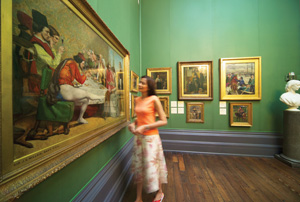Lost in translation
The value of cultural tourism is often overlooked by arts organisations but it can have a profound and positive impact on the sector, says Penny Mills

Cultural tourism is big business in Britain. Visit Britain estimates that Britain’s culture and heritage attracts £4.5bn worth of spending by international visitors annually – a quarter of all spending by this group. This income underpins 100,000 jobs across the UK. For London, 84% of overseas visitors say museums and galleries influence their decision to visit, while 60% say the same for music, theatre and arts performances. The cultural sector has the product but tourism agencies have the platform and the promotional tools.
For many arts organisations the majority of tourists only visit once, but this does not mean that the return on investment is too low to contemplate. 2009’s Nation Brands Index survey reveals that 57% of respondents from 20 countries agree that history and culture are strong influences on their choice of holiday destination. Whether or not they would view themselves as ‘cultural tourists’, most international visitors are interested to learn about and experience the culture of their destination.
THE GREAT BRITISH BUZZ
Visit Britain breaks down cultural tourism into three categories: Cultural Heritage (e.g. the legacy of Shakespeare and his literature), Built or Historical Heritage (e.g. Tower of London) and Contemporary Culture. While cultural and built heritage are more popular and accessible, Britain is ranked fourth out of 50 nations for contemporary culture. Britain’s contemporary culture is the most highly regarded by visitors from Sweden, Poland, Australia, South Africa, Russia, Argentina and Mexico, but is respected throughout the world.
Many campaigns by tourism agencies use culture. However, it is important to promote contemporary culture as a way of presenting a more dynamic view of a modern country – juxtaposed with the heritage aspect that is the chief draw.
IMPACT AND INVESTMENT
In our ‘experience-seeking’ culture, authenticity and uniqueness are increasingly important to some audiences. A parallel trend is visitors looking for experiential holidays, or the opportunity to participate in an event or activity. The quality of experience is vital, since personal recommendation can reach wide and far. Research commissioned by Visit Britain indicates that overseas visitors who go to the theatre are more likely to recommend a visit to Britain than those who don’t. Different aspects of our contemporary culture appeal to different markets, so keeping up with trends and understanding motivations is at the heart of successful campaigns.
Tourism is a sector where statistics count, whether it’s to track impact or attract investment. And as with the arts, such evidence is going to be increasingly essential in these uncertain times. Case studies presented at the Audiences London symposium in May include examples of tourism and the arts working together to raise the profile of the cultural offer amongst locals and visitors. Investment in economic impact studies has been vital. The results of this initial investment are clear: the London Borough of Camden, for example, has successfully attracted further investment to support initiatives such as ‘Love Camden’.
A COLLABORATIVE CULTURE
Another emerging theme is the need for more collaboration between sectors. The Eurostar Culture Connect campaign is one existing and successful example of this: a major long-term partnership with Eurostar between national galleries and museums in London, Paris and Brussels, whereby inbound Eurostar travellers receive 2-for-1 entry to paid exhibitions on presentation of their train ticket.
With the eyes of the world watching in 2012, there has never been a better time to get up to speed. Tourism promotion agencies are hungry for cultural attractions that appeal to holidaymakers, and the arts sector has the stories, events and activities that can drive their campaigns, keep the offer fresh and provide those vital calls to action.
Join the Discussion
You must be logged in to post a comment.